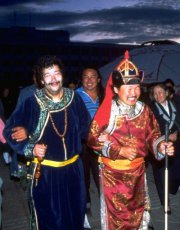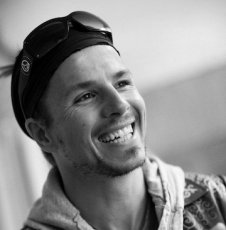|
 What makes a person happy? Americans were ranked 23 in the world in happiness in a 2005 New York Times article, 'A New Measure of Well-Being From a Happy Little Kingdom.' What makes a person happy? Americans were ranked 23 in the world in happiness in a 2005 New York Times article, 'A New Measure of Well-Being From a Happy Little Kingdom.'
Director Tom Shadyac ('Liar Liar' and 'Bruce Almighty') observed his neighbors and colleagues in Beverly Hills and Hollywood, and wasn't surprised at the ranking. He gave the article to Oscar-nominated documentary filmmaker Roko Belic and asked him to explore the subject in a film.
'He told me the article said that America is very rich, but not very happy,' said Belic, who spent the next four years shooting 'Happy, ' in Brazil, Japan, the Namibia Kalahari Desert, the slums of Kolkata, India and locations in the United States.
In addition to documenting people's happiness, Belic also interviewed various American social scientists about the subject.
'Ed Diener [University of Illinois] has spent years researching happiness and has found the one consistency is strong relationships,' Belic said.
Simply told, Americans who strive for six-figure incomes, the big house and new cars, and undergo plastic surgery, all with the belief it will bring happiness, might be wrong.
'We can't all be rich, famous, talented and young,' said Belic, 40, who grew up in Evanston, Illinois. 'We can choose to be a good person or a good friend, and that is more immediately rewarding.'
In Belic's film, 'Happy' images stay with the viewer. Never have Louisiana bayous been so stunning, or the joy of a poverty-stricken Brazilian surfer so luminous, but perhaps it is because Belic received a degree in studio arts from UC Santa Barbara.
 His interest in filming goes back to when he and his brother, Adrian, who co-produced 'Happy,' were children and a neighbor's mom gave her sons and the Belics a Super 8 camera to play with. His interest in filming goes back to when he and his brother, Adrian, who co-produced 'Happy,' were children and a neighbor's mom gave her sons and the Belics a Super 8 camera to play with.
'She wanted us to be quiet,' said Belic, the son of Czechoslovakian and Yugoslavian immigrants.
When he was 18, Belic shot a short film, 'Tarantella,' with Chris Nolan ('Dark Knight' and 'Inception') that aired on PBS.
After college, Belic started his first documentary'sort of. He went on a trip around the world and filmed half of it, until his camera was stolen in Nairobi, Kenya.
'I saw kids raised in Mozambique, who had been maimed during the civil war. Their lips, their noses were missing, but their eyes were beaming with life and I asked myself, 'How is it possible that these kids were capable of true happiness and were so vibrant?''
Back in the United States, Belic worked for Buff LeBoeuff, a post-production editor for Pacific Gas and Electric in San Francisco, in an internship-style job. LeBoeuff paid him for doing odd jobs, such as recording serial numbers on electrical equipment, but also gave him free reign to work on the editing equipment.
'He took me under his wing and taught me a job isn't just about pro'viding money for the family; the job should be about something you have a passion for,' said Belic, who at 27 shot 'Genghis Blues,' a documentary about the journey of blind American singer Paul Pena to the isolated Asian nation of Tuva to compete in Tuvan throat singing. The film won more than 70 awards at film festivals and was nominated for an Oscar in 2000 as best documentary feature.
'I assumed that some money would come in,' Belic said, noting that whenever he saw a name on a marquee he figured that person was rich. 'It didn't work that way for me.' Instead, as he took his film across the country to festivals, he found himself going further into credit-card debt. He was asked if that wasn't stressful, making him unhappy.
'We need to figure out what we're here for,' said Belic, who has a one-year-old daughter. 'Doing something you want to do is more important than doing something you don't want to do, just so you won't be broke.'
Does he worry about providing for his daughter?
'My safety net is my family and friends,' he said. 'Most of us don't recognize that as a safety net. It is easy to feel nobody is there for you, but humans are social creatures. We thrive when we interact with others. It's natural for friends to want to help. There are times when we can easily reach out to others.'
Belic's first language was Yugoslavian. He also speaks Russian, Arabic and Swahili, and can get by in Chinese and Spanish.
'I'm glad I had mentors that showed me a different value system,' he said. In addition to LeBoeuff, he cites his parents, Danica and Nenard, who were more interested in 'living' than being caught up in the American advertising efforts for possessions.
Belic also credits Ralph Leigh'ton, a biographer and producer who inspired 'Genghis Blues,' for helping shape his values. 'He was a stay-at-home dad, whose values were not luxury or pampering.
'If your life is constantly geared towards pampering, that is in direct contrast to deriving experiences,' said Belic, who is now working on a feature film, 'Planet Walker,' written by Tom Shadyac.
Belic, who lives in Malibu, feels that a major shift in thinking about happiness is happening and that people are recalibrating where they are in life. The film 'Happy' may explain why people who are happy live longer, have better relationships, get sick less, have better peer reviews and are better at work.
Research shows that almost everyone can become happier. 'Being happy goes across the board,' Belic said. 'If you love somebody and somebody loves you back, you can be happy. It's that simple.'
The 78-minute film can be viewed on Netflix or iTunes and is also available at Barnes & Noble.
|
|
